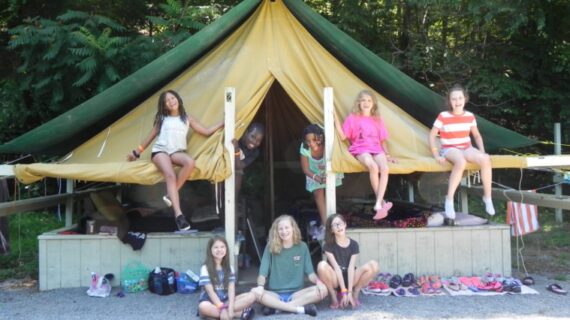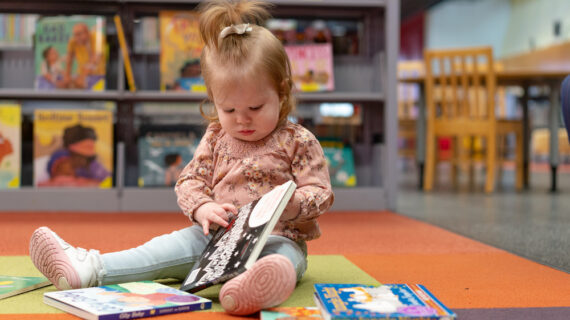
A summer full of stories: Preventing the ‘summer slide’ with reading
Photos by Nancy Andrews/Annie O’Neill Photography courtesy of the Carnegie Library of Pittsburgh.
Endless days of sunshine, ice cream and adventure are here. But sometimes the best adventures can be found inside the pages of a book.
Summer is a time for relaxation, fun and a break from the school routine. However, it can also be a time when kids experience the “summer slide” — a decline in reading and math skills due to the long break from school. But fear not! With some intentional planning and a bit of creativity, parents and kids can prevent the summer slide and keep learning alive all summer long.
How can families make the most of summer reading? Here are some actionable tips and resources to help you (and your kids!) dive into the magical world of stories and learn tons along the way.
Why Summer Reading Matters
Reading during the summer helps maintain and improve literacy skills, says Theresa Maves, senior director of education programs at KinderCare Learning Companies
“Preventing summer learning loss means finding ways to incorporate learning into everyday activities,” she says. “Summer is a great time to expand reading skills by encouraging children to explore new topics and read books for the fun of reading rather than as an assignment.”
Also, your own words and actions can speak volumes. “Children pay attention to everything. When your child sees you reading newspapers, magazines, and books, they too will understand the importance of reading and will want to read,” Maves says. “Reading to your child regularly is by far the best way to encourage your budding reader.”
Research supports this idea. Studies from Harvard University’s Graduate School of Education show that reading and writing as a family and encouraging kids to read independently have a bigger impact on preventing summer learning loss than any other activity — even classes, summer camps or other structured summer activities.
Reading keeps the mind engaged, helps retain the knowledge gained during the school year, fosters a love of learning, and even has emotional benefits for kids.
It’s never too early to start: Maves says early literacy skills begin in infancy and should continue to be nurtured through middle school.
“Reading aloud to your child is critical to setting them on the path to strong reading skills, a better vocabulary, and success in their educational journey and life,” she says.
How to Inspire Kids
Let them choose: According to Sharon G. Flake, a beloved Pittsburgh-based author of children and young adult literature, it is empowering for young children to choose their own books.
Flake loved summer break as a kid. Among her favorite activities? Walking to the local library and getting to choose her own books.
“The librarian trusted me to make my own decisions,” she remembers, and that freedom to explore the library shelves and choose her own books made the experience even more exciting. She found herself hurrying home with books in hand, and would happily lie on her bed reading all summer long.
Use reading as a peaceful break: Tricia Kelley, a librarian at the Children’s Institute’s Day School, adds that reading offers a “calm space” for children in an often overstimulating world, allowing them to relax and escape into different worlds through books.
“Emotionally, regular reading provides a guaranteed ‘calm space’ in a sometimes overstimulating world,” Kelley says.
Create a special reading spot: A welcoming reading environment at home will help inspire kids to read during the summer. Maves suggests establishing an at-home library that evolves with the child’s interests. It doesn’t have to be fancy: You can create a cozy reading nook by setting up a blanket fort or a designating a comfortable chair as a reading spot.
Model reading behavior: Also, Kelley says it’s good to let kids see you reading and planning regular library visits, either virtually or in person. “Seeing their parents read is a big motivation for children,” she says. Consistent daily reading routines, even for just 15 minutes, can significantly benefit younger children.
How to Encourage Reluctant Readers
It’s not always easy to inspire kids to read, but there are strategies to make reading appealing. Kelley advises catering to children’s interests with books related to their favorite activities, movies or TV characters. “Even if their choices seem like ‘junk food’ to adults, they are reading for pleasure something of their own choosing,” she says.
Options like graphic novels and comic books can motivate kids. And Maves recommends making reading a part of everyday routines, such as reading newspapers, comics and even signs during outings.
You can also create special family reading times. “Commit to consistent reading times together as a family — every evening after dinner or before bedtime,” Maves suggests.
How to Help Kids Learn and Remember
To help young readers understand a book and remember it, Maves suggests getting their imaginations engaged before starting a new book. Talk about the title and possible storylines — what might happen in this book?
Interactive reading sessions, where children are encouraged to ask questions and predict plot developments, can deepen their understanding.
And when you’re reading to kids, have fun and get creative: “Read with expression,” Maves says. “Alter your voice for characters and become animated during exciting parts.”
Younger kids also love repetition. It helps them learn and they’ll be proud to “read” along with familiar stories.
Where to Find Summer Reading Resources and Programs
Pittsburgh offers a wealth of resources and programs to support summer reading. Starting locally is a great idea — your neighborhood library, bookstore, and even some ice cream stores are likely to have summer reading programs and challenges.
The Carnegie Library of Pittsburgh provides extensive summer reading programs for children of all ages. These programs often include reading challenges, story time sessions, and fun activities designed to keep kids engaged and motivated. The Carnegie Library’s Summer Reading Extravaganza (Aug 11) is an absolute highlight, featuring book giveaways, author visits, and interactive workshops.
Additionally, organizations like the Pittsburgh Arts & Lectures’ Words & Pictures series bring renowned children’s authors to the city, offering opportunities for young readers to meet their literary heroes.
For technology-savvy families, resources like Overdrive and Libby provide access to a vast collection of e-books and audiobooks, making it easy to find exciting new reads anytime, anywhere.
Sharon G. Flake recommends a diverse selection of books for young readers, including one of her own:
- “Once in a Blue Moon” by Sharon G. Flake
- “Front Desk” by Kelly Yang
- “Looking for True” by Tricia Springstubb
- “Honest June” by Tina Wells
- “Sherlock Holmes” by Alex Woolf
- “Last Days of Summer” by Lamer Giles
- “Dragons in a Bag” by Zetta Elliott
- “The Track Series” by Jason Reynolds
Lastly, here are some fun tips for summer reading…
- Backyard Book Nook: Set up a tent or hammock in the backyard with cozy blankets, pillows, and your favorite snacks for a relaxing outdoor reading retreat.
- Book Treasure Hunt: Hide books around the house or yard with clues leading to each location. Each found book is a new adventure waiting to be read.
- Genre Theme Days: Spice up the week with themed days like “Mystery Mondays,” “Fantasy Fridays” or “Sci-Fi Saturdays,” when everyone picks a book from the chosen genre.
- Pajama Party Story Time: Have a family pajama party where everyone reads their favorite bedtime stories by flashlight under a blanket fort.
- Reading and Craft Combo: After reading a book, create crafts inspired by the story. You could build a dragon from “Dragons in a Bag” or draw a map of a fantasy world you just explored.



















